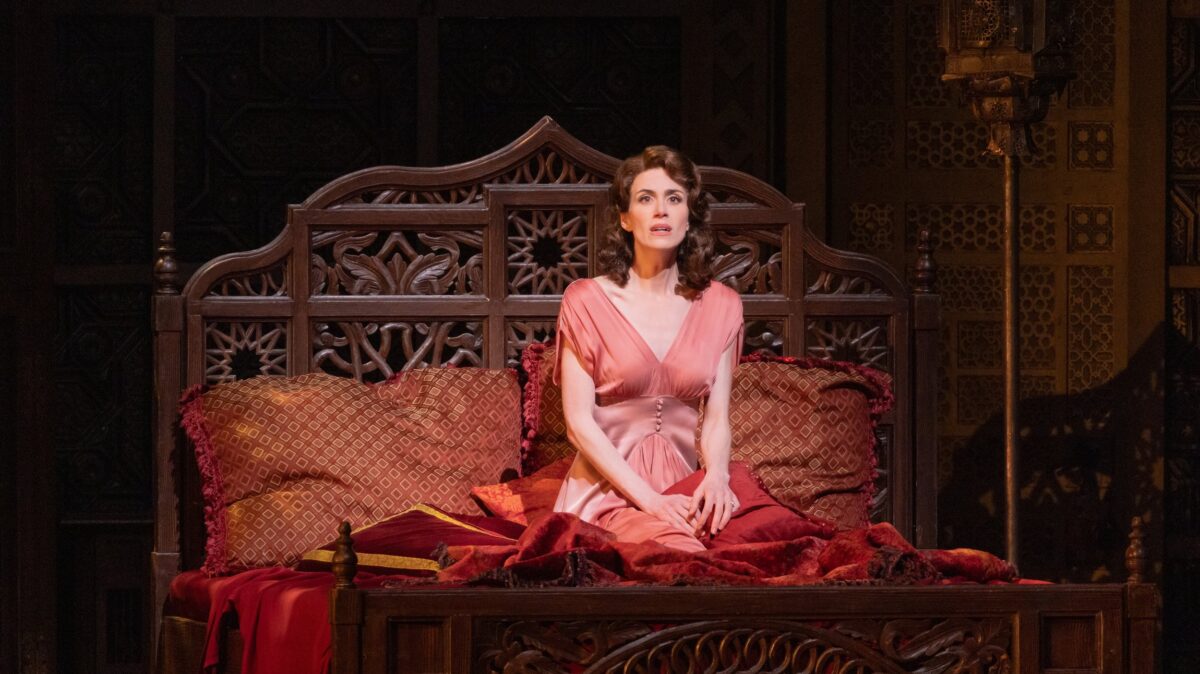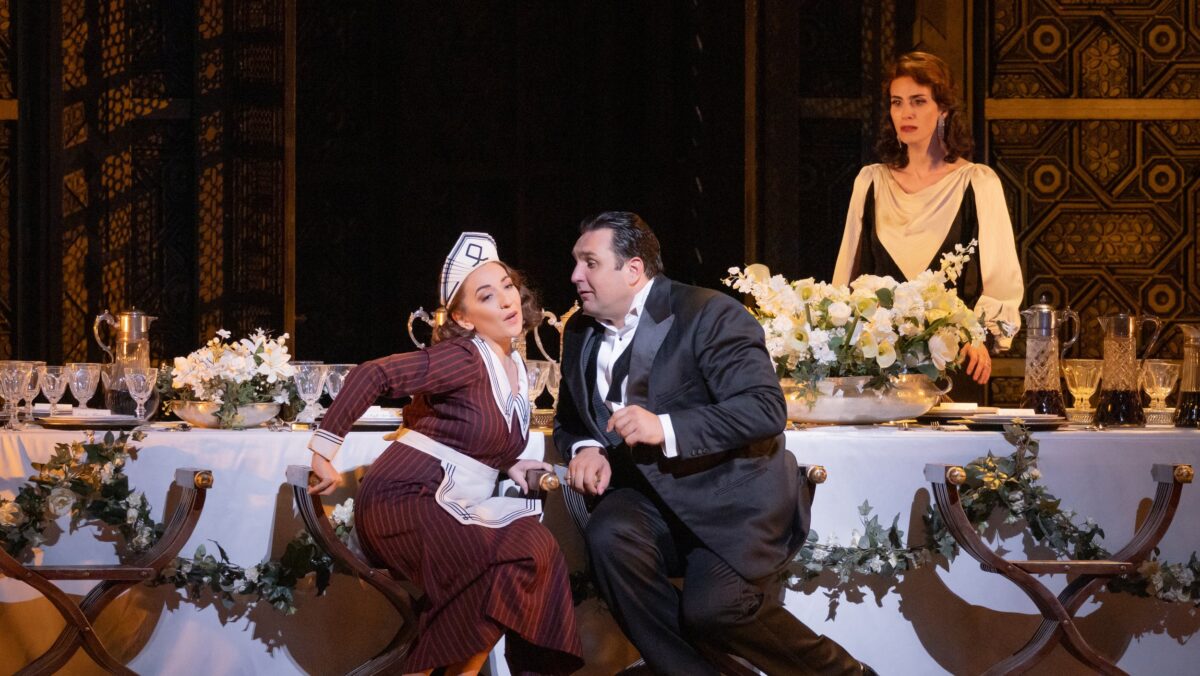

Credit score: Curtis Brown
Jacquelyn Stucker defies pigeonholing. After a doctorate on the New England Conservatory, she was a member of the Jette Parker Younger Artist Programme on the Royal Opera Home the place her roles included Handel’s Alessandro, Henze’s Aphrodite, and a very memorable Frasquita in Barrie Kosky’s new manufacturing of Carmen alongside Aigul Akhmetshina’s Mercédès. Following a pandemic-truncated season in Fest on the Deutsche Oper Berlin, she’s had main successes as Poppea and Rameau’s Dalila at Aix-en-Provence, Lucia di Nobile in Thomas Adès’s Exterminating Angel in Paris, Zabelle in George Benjamin’s Image a Day Like This in London, and Two in Philip Venables’s We Are the Fortunate Ones in Amsterdam. She lately made her Met debut because the Countess and returns subsequent season because the Bride in Saariaho’s Innocence, and is at present in Santa Fe singing the Governess in The Flip of the Screw together with a last-minute jump-in because the Countess on opening evening of Laurent Pelly’s Figaro.
Kevin Ng: You’re identified for the breadth of your repertoire, singing every little thing from Monteverdi to Adès.
Jacquelyn Stucker: I feel there’s an extended custom of fantastic artists engaged on the fringes of the repertoire – singers like Daybreak Upshaw, Lorraine Hunt Lieberson, Richard Croft. It’s what my voice likes to do, however I’m wondering how a lot of that was influenced by this custom of a lyric voice with a functionality and willingness to tackle troublesome music. I didn’t begin in up to date music — I began principally with live performance repertoire by Handel and Bach, and I discovered my method into up to date music within the Jette Parker Younger Artist program on the Royal Opera Home. I feel there are similarities between baroque and up to date music, by way of their therapy of dissonance, use of concord and kind, and I feel that’s what my mind likes.
KN: How do you describe your Fach, and the way does that inform the roles you tackle?
JS: I used to be briefly in Fest on the Deutsche Oper Berlin, and there was sooner or later the place I used to be singing a efficiency of Gretel and rehearsing for Tytania in A Midsummer Night time’s Dream. These aren’t essentially two roles I’d put in the identical Fach, so I feel the definition of it’s fairly free generally. That’s an inefficient preamble to what I’m about to say, which is that I feel my Fach is simply lyric soprano. I don’t sing too excessive or too low, and my voice isn’t too heavy or gentle. I might sing Musetta and Juliette, however I feel a variety of what I do additionally feels directed by what I take pleasure in singing.


Evan Zimmerman/Metopera
KN: Do you ever need to combat for roles that others could understand as being exterior your Fach, both in customary or up to date repertoire?
JS: The one factor I don’t actually sing is Romantic music, particularly the core lyric French or Italian repertoire. A lot of that has to do with fashion; as an illustration, Amina Edris is an effective pal of mine who sings a variety of Massenet, and to do what she does I feel you actually have to talk French and spend time investing in that fashion. Immersing your self in that type of fashion is a full-time job, and I’m somebody who likes to have a variety of part-time jobs.
For Exterminating Angel, I don’t suppose I used to be the perfect voice sort for Lucia di Nobile particularly given how dense the orchestration was. However as a result of the position was so excessive and had some key moments of agility it match my voice, and Tom Adès performed in such a method that made the stability work. With up to date and baroque music, the enjoyable of it’s discovering methods to spotlight your strengths and minimizing your weaknesses. So, I’m not preventing to sing issues like Musetta as a result of proper now there are different issues I’m concerned about doing. Which may change — actually if there’s a manufacturing of Bohème that actually explores the intersection between capitalism and public well being with a younger solid, I’d be very concerned about singing that Mimì. There are some characters that I’ve all the time wished to do however that all the time elude me – Blanche in Carmelites, Alcina, Thérèse/Tirésias. I feel I simply need to get my tooth into these characters so badly that the universe senses my desperation, however I’ll stay affected person and hopeful.
KN: You simply made your Met debut because the Countess in Le nozze di Figaro.
JS: It is a position that everybody informed me that I’d sing once I was a younger artist, however I positively had some concern that my voice wouldn’t be large enough for the position on the Met. So I needed to discover my method, and a giant a part of that, past a variety of training and making certain that I arrived singing the position as effectively as attainable, was the dramatic facet of the character. It’s straightforward to consider the Countess as a tragic sack, however she is simply as flawed as the remainder of the principal quartet, and the dramaturgical battle for her is watching her come to phrases with that over the course of 4 hours of music in heroic keys like C and E-flat Main. Working with Adam Plachetka because the Depend was nice, as a result of we each actually benefited from what the opposite delivered to the desk by way of characterization, and Rosa Feola, now an excellent pal, and I have been capable of stroll that line between mischievous girlfriends and “ride-or-die” confidantes as the 2 characters.
The Countess may not be the Mozart position that looks like the obvious position for me dramatically — for that I’d say Donna Anna at interval pitch, Elettra in a smaller home, Pamina actually wherever — nevertheless it’s changing into a task in my common rotation, which is thrilling. Engaged on the position actually pressured me to develop vocally and dramatically, and so I’m additionally cognizant of preventing for alternatives that can enable me to develop.
What I cherished about Richard Eyre’s manufacturing is in how a lot room there may be for various characterizations. It’s a manufacturing that is sensible of the piece with out decreasing the characters to archetypes, which is the place I really feel that many productions don’t fairly meet the mark. It actually handled the darkness of the work in a method that confirmed each the noble and ignoble sides of every character, all throughout the context of a interval manufacturing. I’m an enormous fan of The Sopranos, so forgive me for these metaphors: my Countess, dwelling her Carmela Soprano delusions, works on this interval manufacturing, as would a Dr. Melfi-esque characterization the place the character’s sturdy sense of ethics is on the core of the interpretation.
KN: Just some years in the past, you have been masking Susanna at Covent Backyard. Your Susanna on the Met, Rosa Feola, is doing her first Countess later this 12 months. Does this replicate an evolution of your Fach, or altering tastes in casting?
JS: That’s a very good query and one I take into consideration so much, as a result of I feel there’s this bizarre concept of there being a hierarchy of roles to graduate into. I’d nonetheless like to sing Susanna — I’d have a lot enjoyable singing that position! Having labored on each roles, I feel they’re difficult in numerous methods. With Susanna it’s extra of a stamina recreation, whereas with Countess it’s scary, uncovered singing in all the passaggi.
With Rosa and I there wasn’t actually a large vocal weight distinction, and this allowed us to make particular decisions with vocal colour and timbre. Dramatically, you may learn into that what you want: possibly they’re nearer in age, possibly they are surely buddies, who is aware of? And with this opera specifically I typically discover it problematic how we conflate vocal attributes with class, age, and even gender. When Rosa informed me she was singing the Countess subsequent season I used to be so excited, and I feel her expertise singing so many Susannas goes to be a boon for that manufacturing. However I feel we, as an trade, most likely want to consider purposefully dismantling these preconceived notions of vocal and even bodily measurement for these roles with a view to provide a range of interpretations to the bigger cultural discourse.


Evan Zimmerman/Metopera
KN: Speak to me just a little about your forays into German repertoire. You’ve carried out Rosalinde in Fledermaus, Pamina, and Gretel. All of these roles have been carried out by everybody from gentle coloraturas to younger dramatics.
JS: It’s such a disgrace that the international language I do know greatest can also be affiliated with the repertoire that I’m not likely considered for. I’ve formally retired Rosalinde – the principle factor with that position, extra so than vocal weight, is whether or not you may get by means of Act I with out panicking the entire time. It’s so excessive and due to this fact fits extra dramatic voices that are snug in excessive tessituras for sustained intervals of time! However, someway Rosalinde is definitely the position I’ve carried out essentially the most variety of instances up to now, though Countess will quickly usurp that title, nevertheless it’s additionally so difficult given all the custom related to that fashion. I actually cherished singing Gretel, as a result of it’s a task that actually fits my voice and I’ve sufficient vocal weight to drag it off with the work’s very dense orchestration. I did Henze’s Phaedra and I cherished that position, nevertheless it was written for Marlis Petersen and I needed to discover my method into it with my voice.
I’d like to do extra Strauss — I feel I have to develop extra technically for roles like Arabella, however I’d like to do Komponist and Octavian. I’m not a Zwischenfach, however I like these characters so much and they’re excellent for a lot of lyric sopranos. If somebody would let me sing Salome simply as soon as, in a small home utilizing the discount that Strauss made, I feel I’d provide a very compelling portrayal of the character – however, solely as soon as in my profession in that very particular atmosphere. However I by no means need to push my voice larger than it needs to go and I really feel like if I have been to do one thing like that, it could be a really complicated alternative for each myself and for different individuals.
I’m 35 now. Despite the fact that individuals nonetheless consult with me as an rising artist I really feel like I’ve considerably emerged. However I really feel at this stage a variety of stress to do repertoire that is sensible. I feel Elsa Dreisig is a very good instance of somebody who’s experimental together with her repertoire in a method that also respects the integrity of her instrument. She sings Countess and Donna Elvira and all this lyric repertoire that’s simply excellent in her voice, after which does issues like Salome and the Donizetti Three Queens in very particular settings. I’d like to do extra of that, however the tradeoff is that should you’re going to purposefully step out of your Fach and the messaging round that needs to be precisely proper, and also you additionally find yourself churning by means of repertoire with the understanding that you could be spend months or years studying a chunk solely to by no means carry out it once more.
KN: I’m curious as to the way you method up to date opera, significantly when a task isn’t written for you. Final season you sang George Benjamin’s Image a Day Like This in a task written for Anna Prohaska, and Thomas Adès‘s Exterminating Angel in a task written for Amanda Echalaz. Their voices couldn’t be any extra totally different from each other.
JS: I feel each composer is totally different, and I do know which of them I can ask for choices. What’s the precedence right here, and what do you want from me musically? Some composers are completely up for that dialog and others need it precisely the best way they wrote it, and I respect each factors of view. For the latter, I nonetheless wish to ask the composer why they wrote one thing in a sure method. Generally there’s a dramatic resolution to creating one thing work — typically I want to change the staging to make one thing work vocally, and typically simply having that perception permits me to intellectualize an answer to an issue alone. Asking for alterations is a final resort; I all the time really feel embarrassed once I really feel I’ve to do this. Most composers, although, have already written in ossias for significantly difficult moments, nevertheless it’s my aim to all the time carry out what the composer initially wished.
I strive to not hearken to different recordings as a result of my voice just isn’t going to perform the identical method as the unique performer. Saariaho’s Innocence is an effective instance the place my voice will match very properly with what Lilian Farahani did; will probably be totally different as a result of I’m totally different, however that’s the good factor with up to date music. You could have as many various interpretations as attainable. With Exterminating Angel, I used to be capable of do issues that I didn’t know I used to be capable of do. It was extraordinarily technically and vocally demanding, however all the time within the service of the drama. George Benjamin’s music is organized differently, and I don’t discover that I’m dwelling in my vocal extremes as a lot however I’m having to consider the musical construction much more. It will depend on the work, it will depend on the composer, however that’s the enjoyable of it.
KN: What are your dream roles, out and in of your Fach?
JS: Like I mentioned, I’d like to do Salome. It’s positively exterior of my Fach and no person ought to let me do it, however I really like that piece and, particularly, that character. There are phrases that I take advantage of from that work to apply approaching register shifts and excessive notes, and from that facet it’s been very helpful. Donna Anna is one other one; I misplaced my father a couple of years in the past, and I’ve but to see a Donna Anna that’s hysterical sufficient over her lifeless father’s physique. There must be much more yelling, and he or she must be completely able to throw herself on her father’s funeral pyre. It could positively need to be at interval pitch, however she’s a personality for which I might provide a really sympathetic characterization. It’s the identical with Salome – I simply noticed it on the Met, and I cherished how the manufacturing highlighted that she’s only a individual processing some trauma they don’t perceive. I actually like that nuance, so I’m wondering what it could be wish to discover that myself. There are roles like Salome which I shouldn’t need however I really need, after which there are roles like Donna Anna which may very well be attainable.
I feel Mimì can also be a kind of characters. It’s a task that may check me dramatically; like, how do you course of being that poor and being in a poisonous relationship like that? Let’s face it, Rodolfo is an extremely well-intentioned manchild. I feel that may be a very fascinating step out of my Fach and it’s seemingly that no person would naturally consider me as a Mimì, however I feel I’d be a very devastating one. That was the principle suggestions I bought from the Countess: that I provided a distinct tackle the character, and for me that’s an important factor. However, actually, if I’m going to justify my presence on any stage, I need to give you one thing new. Singing it in line with some present preconceptions doesn’t earn my place up there in entrance of the pit. In any other case, why are individuals paying $400 a seat?